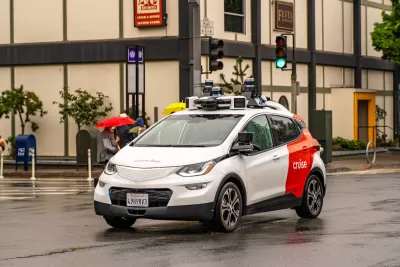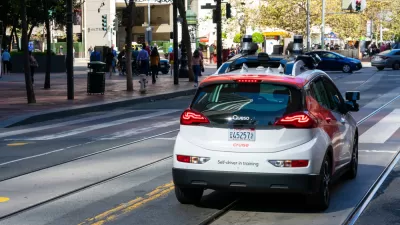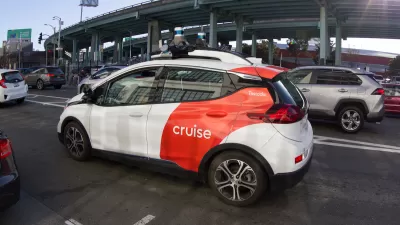The scrutiny facing the troubled self-driving car operator could have significant implications for the industry.

“General Motors' Cruise autonomous vehicle unit is recalling all 950 of its cars to update software after one of them dragged a pedestrian to the side of a San Francisco street in early October,” reports Tom Krisher in the Detroit Free Press.
The company suspended operations of its driverless vehicles after the October 2 crash. “Cruise says in documents posted by the U.S. National Highway Traffic Safety Administration that it already has updated software in test vehicles that are being supervised by human safety drivers. The driverless fleet will get the new software before resuming operations, the company says.” The company says it is adding a ‘chief safety officer’ and investing more in safety and transparency efforts.
The company was already under investigation for several other crashes that resulted in injuries to pedestrians. “Problems at Cruise could slow the deployment of fully autonomous vehicles that carry passengers without human drivers on board. It also could bring stronger federal regulation of the vehicles, which are carrying passengers in more cities nationwide.”
FULL STORY: General Motors recalls all Cruise autonomous vehicles after dragging a pedestrian

Study: Maui’s Plan to Convert Vacation Rentals to Long-Term Housing Could Cause Nearly $1 Billion Economic Loss
The plan would reduce visitor accommodation by 25,% resulting in 1,900 jobs lost.

North Texas Transit Leaders Tout Benefits of TOD for Growing Region
At a summit focused on transit-oriented development, policymakers discussed how North Texas’ expanded light rail system can serve as a tool for economic growth.

Using Old Oil and Gas Wells for Green Energy Storage
Penn State researchers have found that repurposing abandoned oil and gas wells for geothermal-assisted compressed-air energy storage can boost efficiency, reduce environmental risks, and support clean energy and job transitions.

Private Donations Propel Early Restoration of Palisades Playground
Los Angeles has secured over $1.3 million in private funding to restore the Pacific Palisades playground months ahead of schedule, creating a modern, accessible space that supports community healing after recent wildfires.

From Blight to Benefit: Early Results From California’s Equitable Cleanup Program
The Equitable Community Revitalization Grant (ECRG) program is reshaping brownfield redevelopment by prioritizing projects in low-income and environmental justice communities, emphasizing equity, transparency, and community benefits.

Planting Relief: Tackling Las Vegas Heat One Tree at a Time
Nevada Plants, a Las Vegas-based nonprofit, is combating the city’s extreme urban heat by giving away trees to residents in underserved neighborhoods, promoting shade, sustainability, and community health.
Urban Design for Planners 1: Software Tools
This six-course series explores essential urban design concepts using open source software and equips planners with the tools they need to participate fully in the urban design process.
Planning for Universal Design
Learn the tools for implementing Universal Design in planning regulations.
Ascent Environmental
Borough of Carlisle
Institute for Housing and Urban Development Studies (IHS)
City of Grandview
Harvard GSD Executive Education
Toledo-Lucas County Plan Commissions
Salt Lake City
NYU Wagner Graduate School of Public Service





























